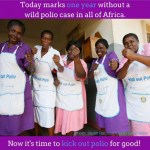World Health Organization
There's a delightful meme going around Facebook right now, featured above, that portrays five African women, fists raised, all wearing aprons proclaiming "Kick out polio!" Accompanying the meme is a message from the American Academy of Pediatrics celebrating that yesterday marked one full year since the last case of polio was recorded on the continent of Africa and praising African leadership in executing successful vaccination campaigns against this dread disease, in particular recent declarations in support of eradication from the African Union Heads of State Summit and the Organization of…
There are some antivaccine lies that just never die. Well, actually, most of them are very much like Jason Voorhees, Michael Myers, and Freddy Krueger in that, just when you think you've killed them at the end of the latest confrontation, they always come back. Always. As an example of this, let's go back four months ago. Remember back in November when I discussed a particularly pernicious antivaccine lie that's been spread by Kenyan Catholic Bishops and the Kenya Catholic Doctors Association? It was the claim that the tetanus vaccine used to prevent neonatal tetanus in young women in Kenya…
The holidays must truly be over. I say this because, starting around Sunday, the drumbeat of blogging topics that I haven't covered but that apparently you, my readers, want me to cover has accelerated. However, before I can move on to what might or might not be greener blogging pastures, material-wise, I feel obligated to finish what I started yesterday, namely the deconstruction of an advertising supplement promoting the "integration" of "traditional medicine" (in particular, traditional Chinese medicine, a.k.a. TCM) for which Science and the American Association for the Advancement of…
If there's one thing about having a demanding day job, it's that the cranks usually have the advantage. They can almost always hit first when a news story comes out that they can spin to attack their detested science. On the other hand, it usually ensures that by the time I get home, have dinner, and settle down in front of the TV with my laptop to discusse the latest bit of science, there's some tasty crankery to deconstruct.
Oddly enough, tonight appears not to be one of those times. Heck, as of this writing, even that wretched hive of antivaccine scum and quackery, Age of Autism,, doesn…
We’re bombarded with numbers every day. But seeing a number and understanding it are two different things. Far too often, the true “significance” of a figure is hidden, unknown, or misjudged. I will be returning to that theme often in these blog posts in the context of water, climate change, energy, and more. In particular, there is an important distinction between accuracy and precision.
Here is one example – reported cases of cholera worldwide. Cholera is perhaps the most widespread and serious water-related disease, directly associated with the failure to provide safe drinking water and…
Hair breaks. It singes. It falls out. It might not be the strongest feature of living human bodies, but hair is one of the best-preserved tissues of dead ones, providing a record of diet, age, metabolism, and, sometimes, even the cause of death.
Ferdinand II*
With intense beams of x-rays at Brookhaven's National Synchrotron Light Source (NSLS), a team of researchers is using hair samples collected from the decomposed bodies of two 15th century Italian royalty to determine how they really died.
The subjects: Ferdinand II (1467-1496)* and Isabella (1470-1524) of Aragon, a medieval kingdom…
Last week in Moscow, the World Health Organization and Russian Federation held the First Global Ministerial Conference on Healthy Lifestyles and Noncommunicable Disease Control, which addressed the "slow-motion catastrophe" of rising rates of non-communicable illnesses like heart disease and diabetes. WHO Director-General Margaret Chan warned that diabetes rates have skyrocketed in both rich and poor countries, but in poor countries "health services are almost totally unprepared to cope with the onslaught of chronic demands that come with the rise of non-communicable diseases."
As the WHO…
Mark Pendergrast writes: To kick off this book club discussion of Inside the Outbreaks, I thought I would explain briefly how I came to write the book and then suggest some possible topics for discussion.
The origin of the book goes back to an email I got in 2004 from my old high school and college friend, Andy Vernon, who wrote that I should consider writing the history of the EIS. I emailed back to say that I was honored, but what was the EIS? I had never heard of it. I knew Andy worked on tuberculosis at the CDC, but I didn't know that he had been a state-based EIS officer from 1978…



